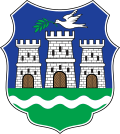 Cover of the first issue, featuring Blackie Lawless | |
| Editor-in-Chief | Konstantin Polzović |
|---|---|
| Categories | Music magazine |
| Frequency | Bimonthly |
| Publisher | Dnevnik |
| Founded | 1991 |
| First issue | May 1991 |
| Final issue | May 1992 |
| Country | Yugoslavia |
| Language | Serbian |
Hard Metal was a Yugoslav music magazine, notable as the first magazine in the country dedicated entirely to heavy metal music.
